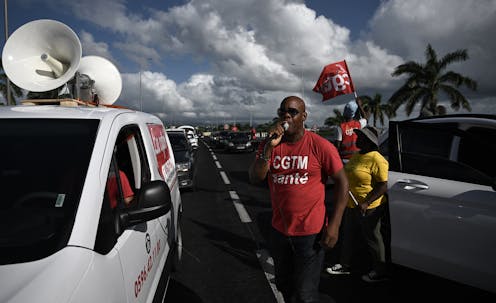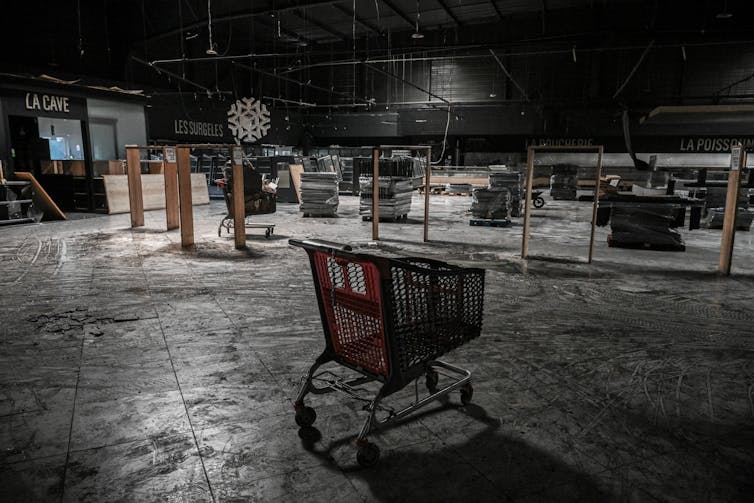The colonial legacy lurking beneath economic unrest in the French Caribbean
Recent protests in the French overseas territories of Martinique and Guadeloupe are ostensibly over cost-of-living increases. But the roots of inequality go much deeper.

For weeks, the French Caribbean island of Martinique has been the site of at-times violent protests over high living costs and worsening economic conditions. And Martinique isn’t alone; in the neighboring French island of Guadeloupe, striking workers stormed the control room of a power station on Oct. 26, 2024, causing a blackout that led to a government-imposed curfew.
Media coverage of the unrest has often focused narrowly on the immediate economic causes. But there is a much longer backstory to the protests, one that takes into account social and political inequality and the lasting legacy of colonialism in the French Caribbean.
Martinicans, who are French citizens, pay significantly higher prices for goods than residents on mainland France, including 40% more for food and 13% more for health care.
At the same time, Martinicans earn significantly less. About 30% of the island population falls below the poverty line, roughly twice the rate of European France.
With household budgets already tight, the impact of inflation triggered the latest wave of protests, with another scheduled for Nov. 1.
But current economic difficulties reflect only the latest illustration of Martinican and Guadeloupean anger over what they feel is an inequitable relationship to mainland France. Similar protests occurred in 2009 and 2021.
While the majority of demonstrations have been peaceful, this resentment has boiled over in recent weeks into violence and vandalism.
Inequality’s colonial roots
The pressures of inflation and a higher cost of living are hardly unique to the French overseas territories – called “départements” in French. But a long history of French colonialism complicates the issue for places like Martinique and Guadeloupe in the Caribbean’s Lesser Antilles, and similarly in New Caledonia in the Southwest Pacific, another site of recent protests that focused on independence and representation for the indigenous Kanak people.
Direct French colonial rule over Martinique and Guadeloupe began in the 17th century and structured the local social system and economy to primarily benefit French economic interests. Like many Western European countries, France developed plantation economies through the enslavement and transplantation of Africans. In overseas territories, enslaved people were exploited to extract commodities – first sugar, and later bananas and rum.
Early French settlers created a minority white ruling class in these colonies. And their descendants, known as “békés,” became the dominant force of a deeply inegalitarian society.
Despite France’s abolition of slavery in 1848, these wealth and power gaps persisted for generations, with much of Martinique’s property and business interests today still concentrated in a few hands – many of them connected to the original béké families. For example, one of France’s wealthiest family-owned businesses Groupe Bernard Hayot dominates the local market in a range of sectors, including agriculture, automobiles and retail.
From colonialism to claims of neocolonialism
People in Martinique and Guadeloupe are highly aware of their colonial past, and it informs much of their recent resistance to the high cost of living on the islands. Martinicans and Guadeloupeans have faced ongoing social, economic and environmental disparities with their overseas compatriots. This is despite the islands transitioning from colonies to départements in 1946, a move that gave the people of Martinique and Guadeloupe French citizenship and the same rights as those in mainland France.
Today, Martinique and Guadeloupe, with populations of around 342,000 and 375,000, respectively, remain fundamentally dependent on France through subsidies and imported goods, as well as trade agreements that promote European imports that makes up more than 80% of the food supply. This involves goods traveling much longer distances – and thus incurring greater costs than if they came through regional trade with Caribbean or Latin American countries.
Moreover, due to the transformation of the islands into monocrop plantations during the colonial era, it is difficult for local farmers to produce enough goods for themselves.

Compounding the difficulties of domestic production are recurrent local grievances over the rampant use of pesticides, which has impacted both fishing and agriculture in the French Caribbean, with certain zones now off-limits for fishing.
For many decades, the pesticide chlordecone, known in the United States as Kepone, was widely used across the globe. While banned in the U.S. in the 1970s, the pesticide was not officially banned in France until 1990, with an exemption permitted for its use on Martinique and Guadeloupe through 1993. From the 1970s to 1993, chlordecone had a particularly high usage rate in the banana plantations of the French Caribbean.
Due to runoff into water sources, roughly 90% of the population of the two islands test positive for chlordecone in their blood. Rates of prostate cancer, which are linked to the carcinogenic pesticide, are the highest in the world, according to one study.
As a result, the sentiment for many of these overseas French is that first they were enslaved, and then they were poisoned – a situation that many protesters see as an ongoing example of neocolonialism.
The decolonial perspective
Given the legacy of colonialism and its consequences on the quality – and equality – of life in French overseas territories, many protesters have embraced a decolonial approach. Alongside an increase in discussions around independence, there has been a discernible shift in the French Caribbean toward regional collaboration, as seen by Martinique’s executive council president Serge Letchimy’s attempt to integrate with the Organization of Eastern Caribbean States. This move toward a more self-sufficient and regional economic model aims to provide greater autonomy from France and, in so doing, help lessen the wealth gap.
Echoing this perspective, Martinican sociologist Malcom Ferdinand observed in 2022 that the ongoing economic struggles in the French Caribbean “are not only linked to the colonial, slave-making, and patriarchal constitution of the modern world … [but] they are, above all else, its consequences.”
A vision of a better future
As Martinicans and Guadeloupeans continue to take to the streets, there are signs that the demonstrations, as they head into their third month, are having an effect.
The French government recently established an agreement with private sector entities involved in retail in Martinique, aiming to cut the price of common goods by 20%.
While many French Caribbean residents will likely view this as a move in the right direction, I believe it is unlikely to mollify local desire for a more equitable future. Channeling the views of many of his fellow overseas French citizens, Martinican writer Patrick Chamoiseau recently argued for greater social and environmental reforms to move beyond the cycle of dependency with Europe.
Without such reform, the French Caribbean, as Chamoiseau writes, will be forced to maintain the “artificial economy” established by colonialism, and Martinicans will thus continue to have “no control over food security … or over a future anything other than tragic.”
David A. Vivian does not work for, consult, own shares in or receive funding from any company or organization that would benefit from this article, and has disclosed no relevant affiliations beyond their academic appointment.
Read These Next
Honoring Colorado’s Black History requires taking the time to tell stories that make us think twice
This year marks the 150th birthday of Colorado and is a chance to examine the state’s history.
When civil rights protesters are killed, some deaths – generally those of white people – resonate mo
From the civil rights era of the 1960s until today, white victims of government violence have received…
Crowdfunded generosity isn’t taxable – but IRS regulations haven’t kept up with the growth of mutual
Some Americans are discovering that monetary help they received from friends, neighbors or even strangers…





